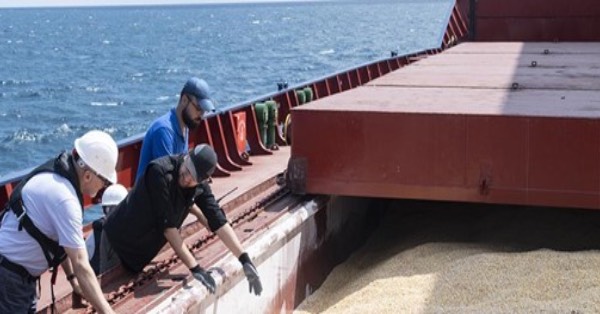
The Joint Coordination Centre has authorized the departure of three vessels from Ukraine, two from Chornomorsk and one from Odesa, carrying a total of 58,041 tons of corn through the maritime humanitarian corridor under the Black Sea Grain Initiative.
The vessels authorized to move tomorrow, 5 August are:
1) M/V Polarnet, anchored in Chornomorsk port, with a cargo of 12,000 MT of corn destined to Karasu, Türkiye
2) M/V Navistar, anchored in Odesa port, with a cargo of 33,000 MT of corn with destination Ringaskiddy, Ireland
3) M/V Rojen, anchored in Chornomorsk port, with a cargo of 13,041 MT corn destined to Teesport, UK
The JCC has also authorized the movement, pending inspection, of M/V Fulmar S, inbound for Chornomorsk. Fulmar S is currently at anchorage at the inspection area near north west of Istanbul.
The three outbound vessels are estimated to depart in the morning from their respective ports. Timings may be affected based on readiness, weather conditions or other unexpected circumstances. Inspection is expected to take place after arrival at the anchorage area in Turkish territorial waters.
The outbound vessel is anticipated to move from her anchorage at 0900hrs after the inspection by the JCC’s inspection team.
Drawing from lessons learnt during the first movement of M/V Razoni, the JCC has authorized this movement as a second ‘proof of concept’, testing multi-ship operations in the corridor including an inbound ship. In addition, the corridor has been revised to allow for more efficient passage of ships while maintaining safety.
The JCC further acknowledges the need for the commercial vessels stranded in the Ukrainian ports since February to depart to their pre-defined destinations. Their movement will free up valuable pier space for more inbound ships to come in and carry food to global markets in line with the Initiative.
As per procedures agreed at the JCC, all participants coordinate with their respective military and other relevant authorities to ensure the safe passage of commercial vessels.
The JCC will monitor closely the safe passage of the vessels through the humanitarian maritime corridor.








































